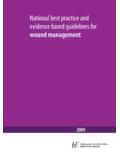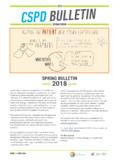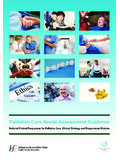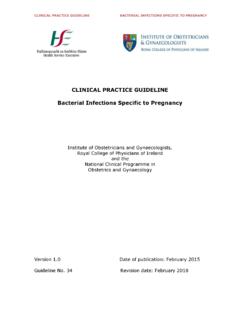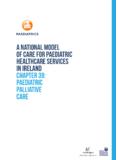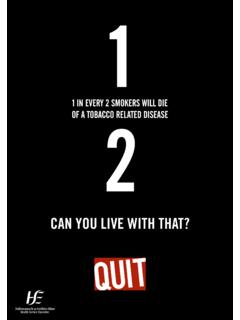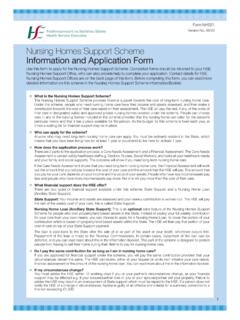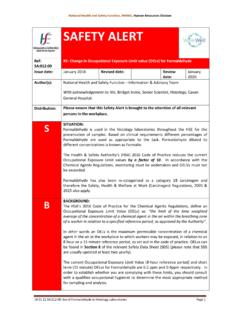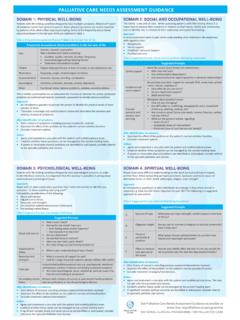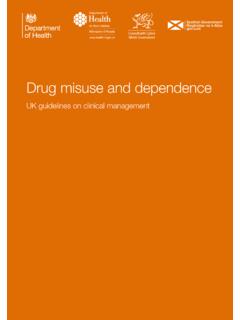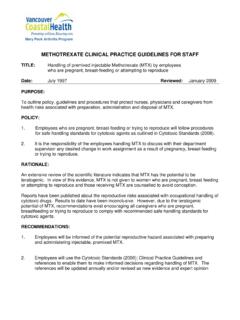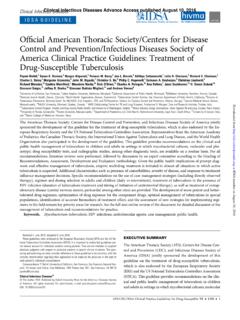Transcription of Clinical Guidelines - Health Service Executive
1 Clinical Guidelines for Opioid Substitution TreatmentClinical Guidelines for Opioid Substitution Treatment (OST)2I am pleased to issue the Clinical Guidelines for Opioid Substitution Treatment on behalf of the Primary Care division of the HSE. The Guidelines arise from a recommendation in the Introduction to the Opioid Treatment Protocol to develop joint Guidelines against which future audits could be HSE established a working group, chaired by Mr Joe Doyle from the Social Inclusion Office, comprising representatives from the College of Psychiatrists of Ireland, the Irish College of General Practitioners, the Pharmaceutical Society of Ireland and HSE Addiction Services. The group reviewed existing national and international Guidelines , consulted with key stakeholders and staff working in the Service and considered submissions in detail.
2 Expert opinion from Professor Michael Farrell, Director of the National Drug and Alcohol Research Centre at the University of New South Wales, was obtained both during the process and on resulting document represents a significant step forward in delivering evidence based approaches to enhance the quality and safety of care that the HSE Addiction Service provides. I wish to commend the Working Group for their hard work over a significant period of time and in particular to thank Mr Joe Doyle for his effort and commitment to completing this Hennessy National Director of Primary CareForeword136A2547 BClinical Guidelines for Opioid Substitution Treatment (OST)3 The HSE established a Clinical guideline working group towards enacting two specific recommendations in the Introduction of the Opioid Treatment Protocol (2010) report.
3 These recommendations were to develop joint Guidelines that would enable benchmarks against which future audits could be measured and to move to less urine testing (with an elimination of supervision) and a greater Clinical focus on the use of the results of drug testing committee was comprised of representatives from the College of Psychiatry of Ireland, the Irish College of General Practitioners, the Pharmaceutical Society of Ireland, HSE Addiction Service Managers, and chaired by the National Social Inclusion Office. The committee drew on relevant Guidelines , such as the UK Guidelines Drug Misuse and Dependence: UK Guidelines on Clinical Management , the NICE Guidelines on Methadone and buprenorphine for the management of opioid Dependence, the Eurometh Methadone Guidelines , and the relevant ICGP Guidelines .
4 Expert opinion was sought during the drafting process and key stakeholder groups were consulted at two points of the drafting process (chapter 2 drug testing and when a composite draft was finalised). The committee considered each submission in detail and adapted the Guideline accordingly. The Guidelines are based on the principles that people who use drugs have the same entitlement as other patients to the services provided by the HSE. Service users have a right to be heard, listened to and taken seriously and should be consulted and involved in all matters and decisions that may affect their lives. The Guidelines have been developed in order to outline evidence-based care to standardise and improve the quality and safety of care to the main illicit opioid used in Europe is heroin, which may be smoked, snorted, or injected.
5 A range of other synthetic opioids are also illicitly available, such as Oxynorm/Oxycontin, codeine, fentanyl, methadone, and buprenorphine. In 2011, eleven European countries reported that 10% or more of their first-time opioid clients entering specialised treatment were using opioids other than Ireland, Opioid Substitution Treatment (OST) refers to the provision of both methadone and buprenorphine/buprenorphine-naloxone. At the end of 2014, there were 9764 people in receipt of OST in HSE Addiction Clinics and GPs, compared with 9,116 in 2013. There were 726 new first time patients in 2014, compared to 552 first time patients in 2013. There were 468 people in receipt of OST in prisons, compared to 539 in December 2013. There were 159 new first time patients in prisons, compared to 169 in 2013.
6 1 1 Most recent information on drug treatment, visit . For interactive tables on drug treatment, visit The involvement of the community pharmacists in the dispensing of methadone has continued to expand over the past decade. At the end of December 2013, there were 6,265 (69%) patients receiving their medication in 628 pharmacies, compared with 3,740 (58%) patients in 329 pharmacies at the end of use has a detrimental impact on individual Service users, their children, families, and society in general. Drug-related mortality rates in Ireland are among the highest in the EU. National and international evidence consistently shows that drug treatment is effective. The Research Outcome Study in Ireland (ROSIE) shows drug treatment leads directly to less involvement in crime and to improvements in employment and training (Comiskey et al.)
7 , 2009). OST has proven to be effective: the focus should now shift to optimising outcomes. These Clinical Guidelines are the first national Guidelines applicable in HSE treatment clinics, as well as in primary care settings; they update and replace the 2008 ICGP Guidelines : Working with Opiate Users in Community Based Primary Care and will provide guidance on the treatment of opioid dependence in Ireland. The Guidelines are targeted at clinicians and patients in the management of Opioid Substitute Treatment (OST), but also for the community and voluntary services that are supporting people s treatment and rehabilitation. Introduction136A2547 BClinical Guidelines for Opioid Substitution Treatment (OST)4 OST plays an intrinsic role in supporting patients to recover from drug dependence.
8 Assessment and recovery care-planning is an ongoing process and, once stabilised on OST, collaborative and active care planning ( using mapping tools and motivational approaches) to consider options across a wide range of personal recovery goals is an important part of a recovery-orientated culture. Treatment should seek to maximise outcomes across a range of domains, including drug and alcohol misuse, Health , and psychosocial are currently 1,000 people working in the addiction services. The Guideline is based on the assertion that interventions must be carried out by trained and competent people, with a clear understanding of the impact of problematic drug use. Investment in upskilling key competencies and the provision of professional support and supervision is essential.
9 It is hoped that the Guidelines will now set the parameters for audit process. The involvement of Service users in this process will be crucial, as will the completion of a brief instrument, such as the Treatment Outcome Profile, to provide important information on the performance of individuals and on the overall performance of the Service (in line with the Introduction of the Opioid Treatment Protocol). The updated and revised National Drug Treatment Reporting System (NDTRS) form will also inform on Service provision; covering data on key working and case management, interventions carried out, information on detoxification, and the condition of the Service user at would like to thank the drafting committee for their patience and commitment to developing this multi-stakeholder guideline.
10 Thanks also to the numerous individuals and stakeholder groups for submitting feedback at various stages. Finally, I would like to gratefully acknowledge the significant contributions of Aoife Davey in drafting and editing this Doyle ChairpersonIntroduction136A2547B36A2547 BClinical Guidelines for Opioid Substitution Treatment (OST)51 Chapter 1: Guiding principles of Opioid Substitution Treatment (OST) Key Points .. Principles underpinning good governance for treatment provision .. Therapeutic Alliance .. Information sharing ..11 Chapter 2: Rehabilitation and psychosocial components of OST Key Points .. OST as a component of rehabilitation .. OST within an integrated care plan .. Psychosocial interventions: matching treatment to Service user need.
